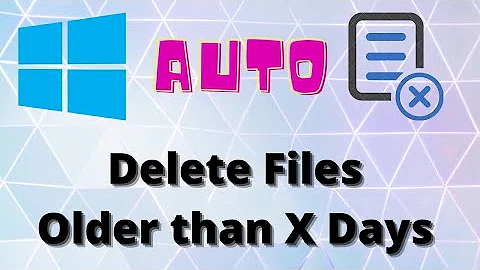Delete all files older than 365 days, but exclude certain folders
Solution 1
You can try this script but it will work only if %%~tA in your regional settings is returning the file date using YMD format. If not, the comparison will not work as expected.
@Echo Off
setlocal enabledelayedexpansion
for /r %%A in (*.cfg;*.dat;*.hdr) do (
set p=%%~pA
set numeric=no
if "!p:~1,1!"=="0" set numeric=yes
if "!p:~1,1!"=="1" set numeric=yes
if "!p:~1,1!"=="2" set numeric=yes
if "!p:~1,1!"=="3" set numeric=yes
if "!p:~1,1!"=="4" set numeric=yes
if "!p:~1,1!"=="5" set numeric=yes
if "!p:~1,1!"=="6" set numeric=yes
if "!p:~1,1!"=="7" set numeric=yes
if "!p:~1,1!"=="8" set numeric=yes
if "!p:~1,1!"=="9" set numeric=yes
if !numeric!==yes (
if "%%~tA" LSS "2012-11-08" (
del %%A
)
)
)
endlocal
EDIT
I think I have managed to modify the script to work the way you want. I had to get rid of /r switch and call a subroutine recursively or the blacklist would not work properly. The blacklist should be stored in blacklist.txt file in the same directory where the script resides. The file should contain full paths to excluded folders without quotes:
D:\excluded folder1
D:\excluded folder2
D:\included folder\excluded folder3
For each folder that is not blacklisted a subroutine is called which searches for files based on extension and then each file's date is compared with the date given. Please test the script thoroughly. I am afraid it may break on folder names containing special characters like % or ^.
@Echo Off
call :browse D:
goto :EOF
:browse
for /d %%A in ("%~1\*") do (
find /i "%%A" %~dp0blacklist.txt > nul
if errorlevel 1 (
call :delete "%%A"
call :browse "%%A"
) else (
echo SKIP %%A
)
)
goto :EOF
:delete
for %%A in ("%~1\*.cfg" "%~1\*.dat" "%~1\*.hdr") do (
if "%%~tA" LSS "2012-10-08" (
echo DEL %%A
del "%%A"
) else (
echo SAVE %%A
)
)
goto :EOF
Solution 2
I think MBu's answer is better than mine since it doesn't rely on an external tool like Robocopy. And if the blacklisted folders list grow my Robocopy command will look ugly. Nevertheless I want to share what I have found.
You can misuse Robocopy to delete old files, filter for certain extensions and exclude multiple directories from scanning - all in one command.
md C:\TrashMe
robocopy C:\ C:\TrashMe *.cfg *.hdr *.txt *.dat /MOVE /E /MINAGE:365 /CREATE /R:1 /W:1 /XD C:\dir1 C:\dir2 C:\TrashMe
rd C:\TrashMe
The batch will create a temporary trash folder named TrashMe.
Robocopy will than move (not copy!) all desired files (correct extension and modified time stamp older than 365 days) to that trash folder. You exclude multiple folders with the /XD switch.
The last action is to remove the trash folder containing all found old files which.
The trick is to use the /CREATE switch so robocopy will create zero-byte files instead of the actual source file. This speeds up the command move and delete part.
Robocopy command in detail
-
robocopycalls C:\Windows\System32\Robocopy.exe which is preinstalled on Windows Server 2003, Vista, 7 and 8 -
C:\is the source folder which should be scanned -
C:\TrashMeis the (temporary) target folder for all found files -
*.cfg *.hdr *.txt *.datare wildcards and will filter for certain file extensions -
/MOVEwill cut&paste all found files instead of copy&paste them -
/Ewill scann all subdirectories -
/MINAGE:365will exclude all files which are newer than 365 days -
/CREATEwill create zero-based files instead of the original source file -
/R:1 /W:1is the number of retries and wait time between if file is locked and can't be deleted -
/XD C:\dir1 C:\dir2 C:\TrashMeis my list of blacklisted folders. I had to include the TrashMe folder as well because it is placed within the source folder
Related videos on Youtube
nixda
Updated on September 18, 2022Comments
-
nixda over 1 year
Edit: After @Mbu answer I realized that my first approach with leading numbers in folders as criteria to exclude isn't the right way. I decided to use a fixed list of folders to exclude.
I want to delete certain files via batch , but exclude a given set of paths to be checked
Example structure
E:. |───MyBatchFile.cmd | ├───yes │ │ no.doc | file has wrong extension │ │ yes.cfg │ │ yes.dat │ │ yes.hgr │ │ │ └───yes │ yes.cfg │ yes.dat │ yes.hgr │ ├───yes │ yes.cfg │ no.dat | file is too new, modified within a year │ no.hgr | file is too new, modified within a year │ |───no1 | folder is on blacklist | importantstuff │ └───no2 | folder is on blacklist importantstuffThe yes and no file names demonstrate which files should be deleted
What I want
Search all files in all folders and subfolders starting at the folder where the batch is placed. If all following conditions are true, delete the file
- file extension is .cfg, .dat, .hgr or .txt
- modified time is more than 365 days old
- Path is not on blacklist
What I have tried
Based on this question, I have:
@echo off for %%i in (.cfg, .dat, .hdr, .txt) do ( forfiles /s /m *%%i /d -365 /c "cmd /c del @path" ) pauseTwo of three issues are solved, but how do I exclude a given set of folders.
LikeE:\no1andE:\no2from my example.-
Rik over 10 yearsWhat issues do you have exactly. To me the batch seems fine besides the fact you used
-p E:"instead of-p E:\. -
Ramhound over 10 years@nixda - Explain the output of what you tried. So we won't have to run it to test it.
-
 MDT Guy over 10 yearsWhy do I suspect powershell maybe the better option here?
MDT Guy over 10 yearsWhy do I suspect powershell maybe the better option here? -
nixda over 10 years@MDTGuy Powershell was my first try. But the Windows 2003 server admin said, that he won't install PowerShell. Luckily Robocopy is already preinstalled :)
-
 David over 10 yearso_O Who would refuse to install PowerShell??
David over 10 yearso_O Who would refuse to install PowerShell?? -
nixda over 10 years@David Yeah, that was pretty much my reaction too :D
-
 Scott - Слава Україні over 10 yearsIt might be easier to handle the top-level initial numeral requirement by doing
Scott - Слава Україні over 10 yearsIt might be easier to handle the top-level initial numeral requirement by doingfor /d %%t in (0* 1* 2* 3* 4* 5* 6* 7* 8* 9*) do for /r %%A in (%%t\*.cfg %%t\*.dat %%t\*.hdr) do …. -
nixda over 10 yearsHi MBu, thanks for your answer. Unfortunately I had to update my question. Maybe you have also an idea for excluding paths via a given blacklist?
-
sryaoperations over 10 years@nixda, I have edited my answer. The new script should work the way you want it.
-
sryaoperations over 10 yearsWell, Robocopy may be a better option if you have folders with names containing CMD special characters.




